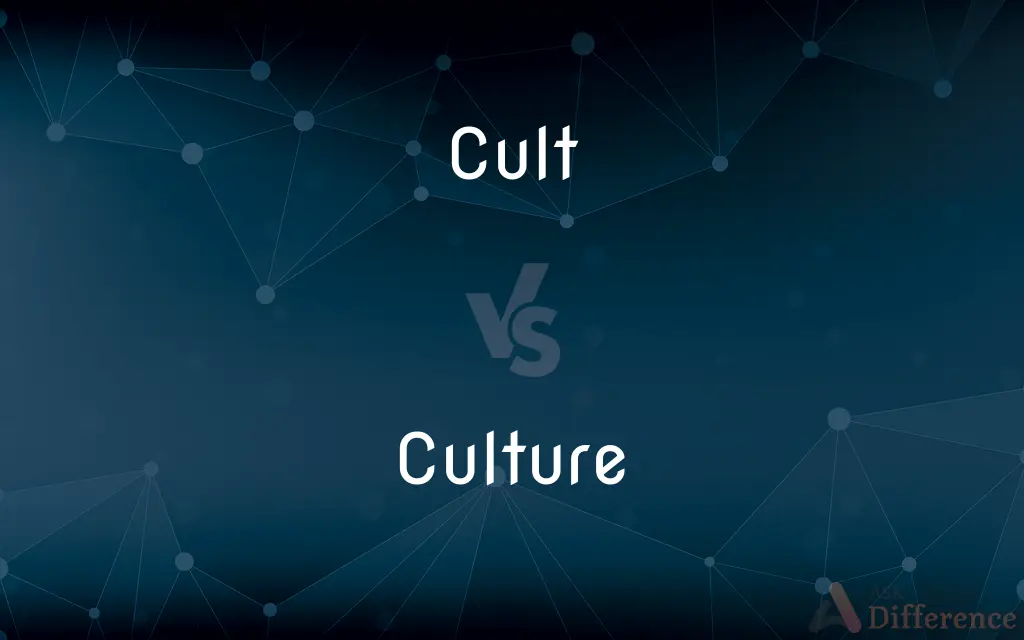Cult vs. Culture — What's the Difference?
By Tayyaba Rehman & Fiza Rafique — Updated on March 16, 2024
A cult is a system of religious beliefs and rituals, often centered around a specific figure, while culture encompasses the social behaviors, norms, and practices of a group.

Difference Between Cult and Culture
Table of Contents
ADVERTISEMENT
Key Differences
Cults are characterized by their intense devotion to a particular figure, ideology, or set of beliefs, often featuring exclusive practices and rituals. Culture, on the other hand, is a broader concept that includes the arts, customs, and habits that define the way of life for a group or society.
While cults usually have a narrow focus with a defined and often charismatic leader, culture represents the collective heritage and shared values of a community or nation, encompassing a wide range of human activities and symbols. This contrast highlights the specificity of cults versus the inclusivity of culture.
Cult membership often involves a high level of commitment and can sometimes lead to isolation from mainstream society, emphasizing the group's distinctiveness. In contrast, culture is inherently inclusive, shaping and being shaped by the members of the community, and is often celebrated for its diversity and adaptability.
The practices and beliefs of a cult can be seen as a subset of cultural expressions, but they are distinguished by their intensity and the often-unquestioned devotion to the group's tenets. Meanwhile, culture encompasses a variety of beliefs and practices, allowing for pluralism and debate within a society.
Cults can sometimes emerge as countercultural movements, challenging or rejecting the dominant cultural norms and proposing an alternative way of life. Culture, however, is all-encompassing, including both mainstream and countercultural elements, and providing a broader context within which different beliefs and practices interact.
ADVERTISEMENT
Comparison Chart
Focus
Intense devotion to specific beliefs/figures
Broad patterns of social behaviors and norms
Leadership
Often centered around a charismatic leader
No specific leadership; shaped by collective heritage
Scope
Narrow, with exclusive practices
Inclusive, encompassing a wide range of human activities
Commitment
High level, sometimes leading to isolation
Varied, generally inclusive and adaptable
Expression
Subset of cultural expressions, marked by intensity
All-encompassing, including diverse beliefs and practices
Position in Society
Can be countercultural, challenging mainstream norms
Includes both mainstream and countercultural elements
Compare with Definitions
Cult
An intense devotion to a person or idea, often with a small group.
The cult of the leader attracted followers from across the country.
Culture
The shared customs, arts, and social institutions of a group.
The city is known for its rich cultural heritage.
Cult
A group often seen as unorthodox or extreme.
The cult's practices were considered radical by mainstream society.
Culture
The way of life for a community or society.
Immersing oneself in the local culture is a great way to understand its people.
Cult
A system of religious veneration centered on a figure or object.
The cult of the deity was marked by elaborate ceremonies.
Culture
A set of shared attitudes and values.
The company's culture emphasizes innovation and teamwork.
Cult
Exclusive group with shared beliefs and rituals.
Members of the cult followed strict dietary rules.
Culture
The collective manifestation of human intellectual achievement.
The museum showcases the culture of ancient civilizations.
Cult
Focused community with strong internal bonds.
The cult thrived in an isolated compound, away from external influences.
Culture
Practices and beliefs passed down through generations.
Traditional dances are an important part of their culture.
Cult
In modern English, a cult is a social group that is defined by its unusual religious, spiritual, or philosophical beliefs, or by its common interest in a particular personality, object, or goal. This sense of the term is controversial, having divergent definitions both in popular culture and academia, and has also been an ongoing source of contention among scholars across several fields of study.
Culture
Culture () is an umbrella term which encompasses the social behavior and norms found in human societies, as well as the knowledge, beliefs, arts, laws, customs, capabilities, and habits of the individuals in these groups.Humans acquire culture through the learning processes of enculturation and socialization, which is shown by the diversity of cultures across societies. A cultural norm codifies acceptable conduct in society; it serves as a guideline for behavior, dress, language, and demeanor in a situation, which serves as a template for expectations in a social group.
Cult
A system of religious veneration and devotion directed towards a particular figure or object
The cult of St Olaf
Culture
The arts, beliefs, customs, institutions, and other products of human work and thought considered as a unit, especially with regard to a particular time or social group
Edwardian culture.
Japanese culture.
Cult
A person or thing that is popular or fashionable among a particular group or section of society
A cult film
The series has become a bit of a cult in the UK
Culture
These arts, beliefs, and other products considered with respect to a particular subject or mode of expression
Musical culture.
Oral culture.
Cult
A religion or religious sect generally considered to be extremist or false, with its followers often living in an unconventional manner under the guidance of an authoritarian, charismatic leader.
Culture
The set of predominating attitudes and behavior that characterize a group or organization
A manager who changed the corporate culture.
Cult
The followers of such a religion or sect.
Culture
Mental refinement and sophisticated taste resulting from the appreciation of the arts and sciences
A woman of great culture.
Cult
A system or community of religious worship and ritual.
Culture
Special training and development
Voice culture for singers and actors.
Cult
The formal means of expressing religious reverence; religious ceremony and ritual.
Culture
The cultivation of soil; tillage
The culture of the soil.
Cult
A usually nonscientific method or regimen claimed by its originator to have exclusive or exceptional power in curing a particular disease.
Culture
The breeding or cultivation of animals or plants for food, the improvement of stock, or other purposes.
Cult
Obsessive, especially faddish, devotion to or veneration for a person, principle, or thing.
Culture
The growing of microorganisms, tissue cells, or other living matter in a specially prepared nutrient medium.
Cult
The object of such devotion.
Culture
Such a growth or colony, as of bacteria.
Cult
An exclusive group of persons sharing an esoteric, usually artistic or intellectual interest.
Culture
To cultivate (soil or plants).
Cult
A group, sect or movement following an unorthodox religious or philosophical system of beliefs, especially one in which members remove and exclude themselves from greater society, including family members not part of the cult, and show extreme devotion to a charismatic leader.
Two former cult members explain the difficulties they had extricating themselves from it.
Culture
To grow (microorganisms or other living matter) in a specially prepared nutrient medium.
Cult
The veneration, devotion, and religious rites given to a deity (especially in a historical polytheistic context), or (in a Christian context) to a saint.
The cult of Apollo
The cult of Mary
Culture
To use (a substance) as a medium for culture
Culture milk.
Cult
(informal) A group of people having an obsession with or intense admiration for a particular activity, idea, person or thing.
The heavy metal cult; the cult of basketball; the guitarist's cult of loyal fans; the cult of celebrity
Culture
The arts, customs, lifestyles, background, and habits that characterize humankind, or a particular society or nation.
Cult
Of or relating to a cult.
Culture
The beliefs, values, behaviour and material objects that constitute a people's way of life.
Cult
Enjoyed by a small, loyal group.
A cult horror movie
Culture
The conventional conducts and ideologies of a community; the system comprising the accepted norms and values of a society.
Cult
Alternative form of kvlt.
Culture
(anthropology) Any knowledge passed from one generation to the next, not necessarily with respect to human beings.
Cult
Attentive care; homage; worship.
Every one is convinced of the reality of a better self, and of the cult or homage which is due to it.
Culture
(botany) Cultivation.
Cult
A system of religious belief and worship.
That which was the religion of Moses is the ceremonial or cult of the religion of Christ.
Culture
(microbiology) The process of growing a bacterial or other biological entity in an artificial medium.
Cult
A system of intense religious veneration of a particular person, idea, or object, especially one considered spurious or irrational by traditional religious bodies; as, the Moonie cult.
Culture
The growth thus produced.
I'm headed to the lab to make sure my cell culture hasn't died.
Cult
The group of individuals who adhere to a cult (senses 2 or 3).
Culture
A group of bacteria.
Cult
A strong devotion or interest in a particular person, idea or thing without religious associations, or the people holding such an interest; as, the cult of James Dean; the cult of personality in totalitarian societies.
Culture
(cartography) The details on a map that do not represent natural features of the area delineated, such as names and the symbols for towns, roads, meridians, and parallels.
Cult
Adherents of an exclusive system of religious beliefs and practices
Culture
(archaeology) A recurring assemblage of artifacts from a specific time and place that may constitute the material culture remains of a particular past human society.
Cult
An interest followed with exaggerated zeal;
He always follows the latest fads
It was all the rage that season
Culture
(euphemism) Ethnicity, race (and its associated arts, customs, etc.)
Cult
A system of religious beliefs and rituals;
Devoted to the cultus of the Blessed Virgin
Culture
(transitive) to maintain in an environment suitable for growth especially of bacteria cultivate}}
Culture
(transitive) to increase the artistic or scientific interest in something cultivate}}
Culture
The act or practice of cultivating, or of preparing the earth for seed and raising crops by tillage; as, the culture of the soil.
Culture
The act of, or any labor or means employed for, training, disciplining, or refining the moral and intellectual nature of man; as, the culture of the mind.
If vain our toilWe ought to blame the culture, not the soil.
Culture
The state of being cultivated; result of cultivation; physical improvement; enlightenment and discipline acquired by mental and moral training; civilization; refinement in manners and taste.
What the Greeks expressed by their paidei`a, the Romans by their humanitas, we less happily try to express by the more artificial word culture.
The list of all the items of the general life of a people represents that whole which we call its culture.
Culture
The cultivation of bacteria or other organisms (such as fungi or eukaryotic cells from mulitcellular organisms) in artificial media or under artificial conditions.
Culture
Those details of a map, collectively, which do not represent natural features of the area delineated, as names and the symbols for towns, roads, houses, bridges, meridians, and parallels.
Culture
To cultivate; to educate.
They came . . . into places well inhabited and cultured.
Culture
A particular society at a particular time and place;
Early Mayan civilization
Culture
The tastes in art and manners that are favored by a social group
Culture
All the knowledge and values shared by a society
Culture
(biology) the growing of microorganisms in a nutrient medium (such as gelatin or agar);
The culture of cells in a Petri dish
Culture
(bacteriology) the product of cultivating micro-organisms in a nutrient medium
Culture
A highly developed state of perfection; having a flawless or impeccable quality;
They performed with great polish
I admired the exquisite refinement of his prose
Almost an inspiration which gives to all work that finish which is almost art
Culture
The attitudes and behavior that are characteristic of a particular social group or organization;
The developing drug culture
The reason that the agency is doomed to inaction has something to do with the FBI culture
Culture
The raising of plants or animals;
The culture of oysters
Common Curiosities
Is culture always inclusive?
Culture is generally inclusive, reflecting the shared heritage and values of a community, though it can also include subcultures and countercultural movements.
What defines a cult?
A cult is defined by its religious or ideological devotion, often centered around a specific figure or set of beliefs, with exclusive practices.
Can a cult be part of a culture?
Yes, the practices and beliefs of a cult can be seen as a subset of a larger culture, though they are often distinguished by their intensity and exclusivity.
How does culture differ from a cult?
Culture encompasses the broad patterns of behavior, traditions, and practices of a group or society, while a cult is more narrowly focused on specific beliefs or figures.
How do cults interact with mainstream society?
Cults can sometimes isolate themselves from mainstream society or challenge dominant cultural norms, creating alternative communities with distinct beliefs.
Can a culture change over time?
Yes, cultures are dynamic and can evolve with societal changes, incorporating new ideas and influences while retaining traditional elements.
How are cults viewed by the wider society?
Cults are often viewed with skepticism or concern due to their intense devotion and sometimes radical practices, contrasting with the broader acceptance of cultural diversity.
How does one become a part of a culture?
Individuals are typically born into a culture and absorb its values, norms, and practices through socialization. However, one can also adopt a new culture through immersion and adaptation.
What role does leadership play in cults and culture?
Cults often have charismatic leaders who centralize authority, while culture lacks specific leadership, being shaped collectively by the community.
Can someone belong to multiple cultures?
Yes, individuals can belong to multiple cultures, a phenomenon known as cultural hybridity, where they blend and navigate between different cultural identities.
What makes a cult controversial?
Cults can be controversial due to their unconventional beliefs, secretive practices, potential for manipulation by leaders, and the impact on members' autonomy and well-being.
How does globalization affect culture?
Globalization leads to cultural exchange and fusion, resulting in more interconnected and hybrid cultures, but it can also threaten the preservation of traditional cultures.
What are the characteristics of a cult?
Cults are characterized by their exclusive beliefs, intense devotion to a specific figure or ideology, and often, a high level of commitment from members.
How is cultural identity formed?
Cultural identity is shaped by various factors, including ethnicity, nationality, language, and the shared beliefs and practices of a community, providing a sense of belonging.
Are all cults religious?
Not all cults are religious; some may center around secular ideologies, charismatic leaders, or specific lifestyles, focusing on philosophical or social principles.
Can a cult transform into a mainstream religion?
Some cults have evolved into mainstream religions over time, gaining broader acceptance and a larger following, which can lead to a shift in societal perceptions.
Share Your Discovery

Previous Comparison
Cart vs. Lorry
Next Comparison
Kind vs. SweetAuthor Spotlight
Written by
Tayyaba RehmanTayyaba Rehman is a distinguished writer, currently serving as a primary contributor to askdifference.com. As a researcher in semantics and etymology, Tayyaba's passion for the complexity of languages and their distinctions has found a perfect home on the platform. Tayyaba delves into the intricacies of language, distinguishing between commonly confused words and phrases, thereby providing clarity for readers worldwide.
Co-written by
Fiza RafiqueFiza Rafique is a skilled content writer at AskDifference.com, where she meticulously refines and enhances written pieces. Drawing from her vast editorial expertise, Fiza ensures clarity, accuracy, and precision in every article. Passionate about language, she continually seeks to elevate the quality of content for readers worldwide.














































